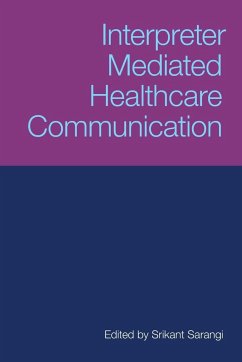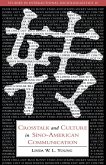Healthcare delivery, especially in the primary care sector, is increasingly becoming multicultural and multilingual in character. This global reality manifests itself as communicative challenges in interpreter-mediated consultations, involving professional as well as family members in the role of interpreters. The contributors to this volume, drawn from different parts of the world (Australia, Germany, Italy, The Netherlands, South Africa, Spain, Sweden, Switzerland, UK and USA), share the view that interpretation in the mediated sense is more than linguistic or literal translation, thus going beyond the conduit model of communication. As the empirical studies illustrate, the interpreters professional or non-professional position themselves actively in the interaction as their roles and participation formats become situationally and culturally embedded, albeit in varying degrees in different phases of the consultation.
Interpreter-Mediated Healthcare Communication engages conceptually and empirically with the ongoing debate concerning the 'influence' occasioned by the participation of an interpreter - whether professionally trained or as a lay family member - in healthcare delivery. Healthcare delivery, especially in the primary care sector, is increasingly becoming multicultural and multilingual in character. This global reality manifests itself as a communicative challenge in interpreter-mediated healthcare consultations, involving professional as well as family members in the role of interpreters. In the context of this book (previously published as a special issue of the journal Communication & Medicine), interpreter-mediated healthcare consultations are seen simultaneously as multilingual and multiparty interactions, as well as being dyadic and triadic communication. The introductory editorial sets the scene by foregrounding the core notion of 'communicative vulnerability' of all participants - the care recipient, the healthcare provider and the interpreter - in relation to the emergent interactional subtleties at the spheres of participation and interaction. In addition to the 'brought along' communicative vulnerability of the participants, the interactional trajectory itself, iteratively, contributes to such vulnerability at the contingent level. Especially, the interpreter routinely shifts between 'just being a linguistic/literal medium/conduit' to 'strategically being a communicative mediator/broker', potentially influencing the processes and outcomes of a given healthcare encounter. The contributors to the volume, representing different parts of the world (Australia, Italy, the Netherlands, Sweden, UK and USA), address, in different ways, the complexities surrounding the concepts of 'participation', 'mediation' and 'shifts in roles/frames/footings' and their interactional manifestation/consequence. As the empirical studies illustrate, the interpreters - professional or otherwise - position themselves actively in the interaction as their roles and participation formats become situationally and culturally embedded, albeit in varying degrees in different phases of the consultation. The contributions engage along a variety of axes as far as the data settings are concerned - professional vs. lay interpreters, primary vs. tertiary healthcare setting and low-stake vs. high-stake encounters. The issues raised in the book - albeit dealing mainly within the confines of the western healthcare landscape - point in the direction of how 'communicative vulnerability' may be heightened in relation to the currently dominant paradigms of patient-centredness, patient autonomy and shared decision making.
Hinweis: Dieser Artikel kann nur an eine deutsche Lieferadresse ausgeliefert werden.
Interpreter-Mediated Healthcare Communication engages conceptually and empirically with the ongoing debate concerning the 'influence' occasioned by the participation of an interpreter - whether professionally trained or as a lay family member - in healthcare delivery. Healthcare delivery, especially in the primary care sector, is increasingly becoming multicultural and multilingual in character. This global reality manifests itself as a communicative challenge in interpreter-mediated healthcare consultations, involving professional as well as family members in the role of interpreters. In the context of this book (previously published as a special issue of the journal Communication & Medicine), interpreter-mediated healthcare consultations are seen simultaneously as multilingual and multiparty interactions, as well as being dyadic and triadic communication. The introductory editorial sets the scene by foregrounding the core notion of 'communicative vulnerability' of all participants - the care recipient, the healthcare provider and the interpreter - in relation to the emergent interactional subtleties at the spheres of participation and interaction. In addition to the 'brought along' communicative vulnerability of the participants, the interactional trajectory itself, iteratively, contributes to such vulnerability at the contingent level. Especially, the interpreter routinely shifts between 'just being a linguistic/literal medium/conduit' to 'strategically being a communicative mediator/broker', potentially influencing the processes and outcomes of a given healthcare encounter. The contributors to the volume, representing different parts of the world (Australia, Italy, the Netherlands, Sweden, UK and USA), address, in different ways, the complexities surrounding the concepts of 'participation', 'mediation' and 'shifts in roles/frames/footings' and their interactional manifestation/consequence. As the empirical studies illustrate, the interpreters - professional or otherwise - position themselves actively in the interaction as their roles and participation formats become situationally and culturally embedded, albeit in varying degrees in different phases of the consultation. The contributions engage along a variety of axes as far as the data settings are concerned - professional vs. lay interpreters, primary vs. tertiary healthcare setting and low-stake vs. high-stake encounters. The issues raised in the book - albeit dealing mainly within the confines of the western healthcare landscape - point in the direction of how 'communicative vulnerability' may be heightened in relation to the currently dominant paradigms of patient-centredness, patient autonomy and shared decision making.
Hinweis: Dieser Artikel kann nur an eine deutsche Lieferadresse ausgeliefert werden.








